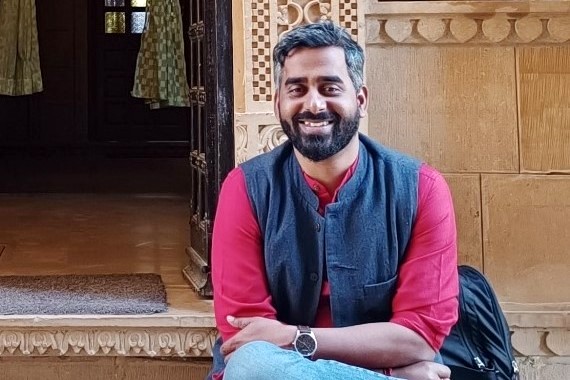India, a land of diverse cultures and cuisines, is also a nation grappling with significant food challenges. Despite being the world's second-largest food producer, a substantial portion of the population continues to face hunger, malnutrition, and food insecurity. This paradox highlights the pressing need for innovative and sustainable solutions in the food sector.
Gyan Prakash, a passionate advocate for sustainable development and social impact, has been at the forefront of tackling these issues. As the Program Head of the SBI Youth for India Fellowship, he has dedicated his career in empowering young leaders to address some of the nation’s most pressing societal challenges. A YFI alumnus himself, Gyan's experience working with rural communities in Uttarakhand has given him a profound understanding of the complexities of India's food systems.
In this article, he sheds light on the critical food challenges facing India and highlights the transformative role of innovation. He explores how initiatives spearheaded by SBI Youth for India Fellowship alumni are fostering sustainable practices, revitalizing indigenous food systems, and empowering local communities. Together, these efforts are shaping a more food-secure and nutritious future for India.
Read the article below for detailed insights.
Transforming Nutrition in India: Innovations Bridging Health and Community Development
The food industry in India is one of the largest and most diverse industries in the country, playing a vital role in the economy and livelihood of millions of people. The agriculture-driven economy comprises a wide range of activities, from farming and food processing to distribution and sales. As the world's second largest food producer, India produces crops such as wheat, rice, ragi and beans, as well as a variety of fruits and vegetables.
Food Challenges and Lack of Nutrition in India
Today, the world is facing serious food challenges, especially in the areas of hunger, malnutrition and food security. According to a 2022 report by the United Nations, despite progress in agriculture, 16% of India’s population, i.e. 224.3 million people, continue to be malnourished. Also, according to data from the National Family Health Survey (NFHS-5) (2019-21), the prevalence of obesity in India has significantly increased compared to earlier years. Nearly one in every four Indians is now classified as overweight or obese, primarily due to poor access to food.
India is also facing serious problems related to malnutrition not only due to undernourishment but also due to overconsumption of low- nutrient foods. Despite being a major agricultural producer, India's food system is heavily affected by problems such as soil erosion and excessive use of chemical fertilizers, which reduce the nutritional quality of the crops and lead to malnutrition. Also, increasing consumption of processed food and fast food has led to malnutrition, especially in urban areas, leading to diseases such as obesity and diabetes.
Innovations in Food and Nutrition
As part of the growing focus on sustainable and nutritious food solutions, many new age entrepreneurs are not only addressing the existing gap in food and nutrition but also empowering the local communities through innovative solutions. For example, Nishant Singh and Sai Anurag Nandagiri’s projects are making a significant impact by reviving traditional crops and connecting them with modern needs.
Founded by Nishant Singh, Jawhar Farm based in Jawhar, Maharashtra, promotes ragi, an ancient superfood. By offering products like ragi cookies and ragi ghee-jaggery laddoos, Jawhar Farm caters to urban health-conscious consumers while also empowering tribal women through sustainable livelihoods. This social enterprise preserves traditional agricultural practice of growing ragi, while also promoting economic independence for the tribal women.
Similarly, Sai Anurag Nandagiri’s project in Jhadol Tehsil, Udaipur, is reintroducing indigenous millet varieties such as finger millet and kodo millet to the region. By incorporating millet-based recipes into meals served at Anganwadi centers, his project aspires to improve children's nutrition by promoting locally-sourced, and nutrient-rich food.
Both Nishant Singh and Sai Anurag’s work highlight the power of combining tradition with innovation to meet modern nutritional needs while fostering sustainable, community-driven food solutions.
SBI Foundation supports such Social Entrepreneurs working in the food sector play a vital role by offering financial assistance, mentorship, and expert guidance. This support is crucial for entrepreneurs who are still in the learning phase. One such initiative is 'SBI YFI Sahyog - The Pitch Fest'. Through this platform, SBI Foundation provides seed funding to social enterprises set up by alumni of SBI Youth for India Fellowship with a focus on driving positive change in their regions. Through this initiative SBI YFI has supported over 24 social enterprises, to help these ventures grow.
Conclusion
India’s food sector, while rich in diversity and production capabilities, faces pressing challenges in both undernutrition and overconsumption of low-nutrient foods. By incorporating traditional foodstuffs such as ragi and millets, it not only provides healthy food, but also supports the community in society by improving health and food security. As we celebrate World Food Day, innovations like these offer hope for a more sustainable and equitable future where rural and urban people benefit from nutritious food.








.jpg)










